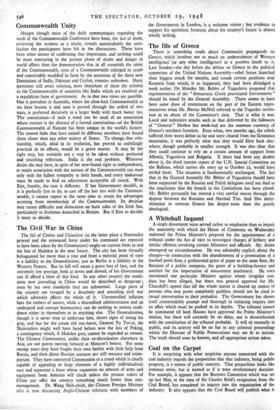The Ills of Greece
There is something crude about Communist propaganda on Greece, which involves not so much an underestimate of Western intelligence' (or any other intelligence) as a positive insult to it. Last Sunday—the day before the debate on Greece in the political committee of the United Nations Assembly—rebel forces launched their biggest attack for months, and retook certain positions near Kastoria from which, it so happened, they had been dislodged a week earlier. On Monday Mr. .Bebler of Yugoslavia proposed that representatives of the "democratic Greek provisional Government" should be heard by the General Assembly. There seems to have been some show of resentment on the part of the Eastern repre- sentatives when Mr. Hector McNeil referred to the Yugoslav resolu- tion as an abuse of the Committee's time. That is what it was. Local and indecisive attacks such as that delivered by the followers of " General " Markos last week-end are the common currency of Greece's northern frontiers. Even when, two months ago, the rebels suffered their worst defeat so far and were cleared from the Grammos mountains, it was perfectly clear that they would filter back else- where, though probably in smaller strength It was also clear that they could continue to rely on a certain amount of support from Albania, Yugoslavia and Bulgaria. If there had been any doubts about it, the third interim report of the U.N. Special Committee on the Balkans, which carries the story up to October 22, would have settled them. The situation is fundamentally unchanged. The fact that in the General Assembly Mr. Bebler of Yugoslavia should have been supported by the Russian and Polish delegates need not lead to the conclusion that the breach in the Cominform has been closed. Mr. Bebler personally has steered a very careful course through the dispute between the Russians and Marshal Tito. And Slav deter- mination to overrun Greece has deeper roots than the purely ideological.


































 Previous page
Previous page